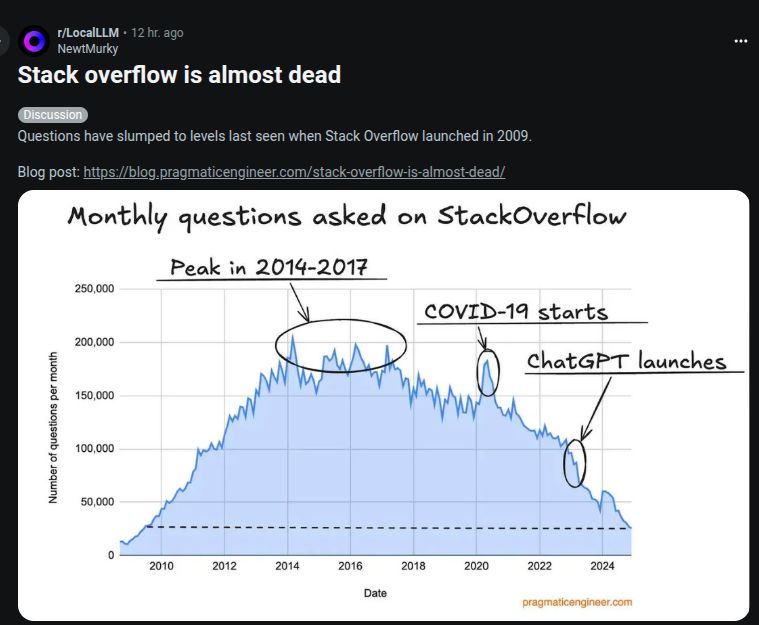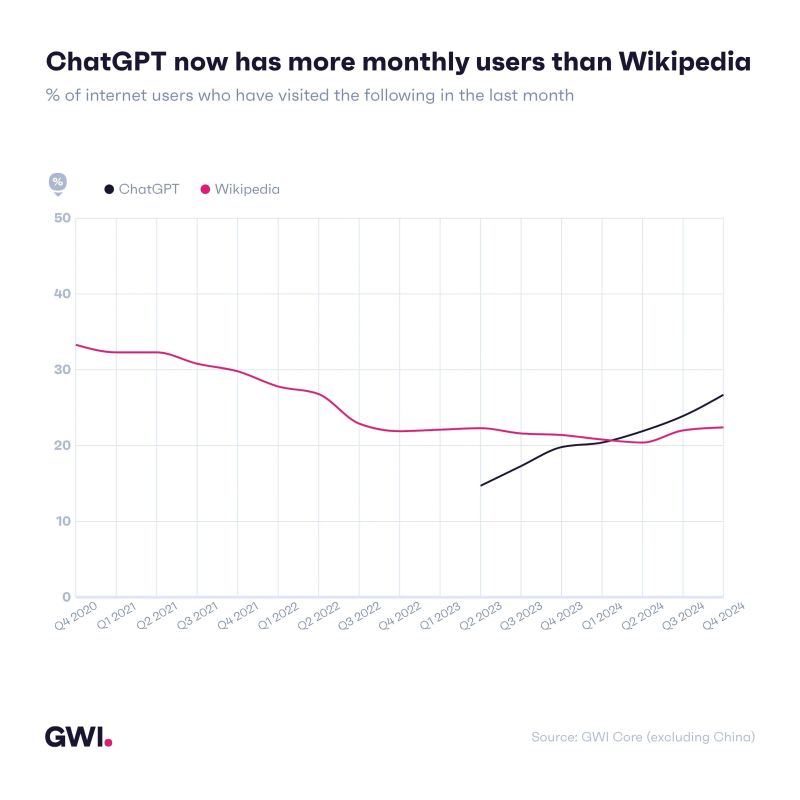Participation in online collaborative sites is decreasing, and the numbers are striking. Matt Asay recently wrote an article about how there are fewer people asking questions on Stack Overflow. If you look at December 2023 to December 2024, the number of questions that were asked dropped by 40%.
You can watch the video version of this article on YouTube.
Since ChatGPT has been released, he pointed out in 2023, there’s been this dramatic decline in the number of questions asked on Stack Overflow. However, the number of questions asked on Stack Overflow has been dropping since 2018, as shown in the graph. Perhaps there’s something else also going on.

The Wikipedia Connection
In the comments of this article, somebody wrote that Wikipedia was also seeing a drastic drop in the number of people reading articles on Wikipedia. They proved this by showing a graph that demonstrated a larger percentage of internet users were using ChatGPT than using Wikipedia.

This assumes more people are going to ChatGPT to get an answer than are looking it up on Wikipedia. This raised the question of whether fewer people contributing to these tools. If fewer people are asking questions or looking for answers there, does that mean contribution goes down?
Stack Overflow’s Model and Declining Contributions
Starting with Stack Overflow, I don’t have exact numbers, but I think you could probably make a reasonable argument that this would be true because of Stack Overflow’s model. Stack Overflow works by having people ask questions and others answer them. So if you have fewer questions, you probably have fewer answers.
Wikipedia: A Different Story
If you look at Wikipedia, I think it’s a little more complicated than that because of the way that Wikipedia rewards contributions. I went to Wikipedia’s metrics site to examine the percentage of users contributing to Wikipedia.
The growth rate has been flat for the last couple of years, which is interesting. But it hasn’t dropped off like we saw in Stack Overflow. It’s been flat since 2018 again, suggesting there’s something else other than just AI going on there.

But at least the fewer people reading Wikipedia has not caused fewer contributions to Wikipedia, although maybe it has stalled the growth rate. It’s unclear from this graph and unclear from the data that I have.
Why Wikipedia is Different
I think it’s because Wikipedia’s model is very different. Wikipedia doesn’t publish how many people read your answer, and doesn’t reward you in numbers like Stack Overflow or YouTube does.
Instead, Wikipedia’s contributors are probably more motivated by seeing articles completed, or how many articles they wrote for the community that they’re participating in, or the community of contributors that they have.
So it seems like a drop in the number of people reading the article would have a less direct impact on people contributing to the article.
The Financial Impact
Now Wikipedia did go through an effort recently to move from getting most of their financial contributions from companies to getting most of their financial contributions from readers. And so ultimately, if there were fewer readers, you could imagine that Wikipedia’s Wikimedia Foundation would be affected and that would affect contributors eventually.
What About Open Source Software?
Now, does the Stack Overflow and Wikipedia trend, if they’re accurate, this decline in people asking questions and reading articles, does that relate to open source software?
In the open source software world, I thought this would relate to people using the software. So I thought what we would want to look at is the number of people downloading packages like software ready to consume.
The NPM Data
I went to NPM, a package manager, and looked at the statistics for the top projects on NPM. There is not a dramatic decline in the number of people downloading packages from NPM.

You could argue that the number of users of open source software, the number of people that download the software to use, would fall much later after people have stopped contributing because the software is still very useful as it is. People don’t need changes. And so if people stopped contributing to open source software, there might be some kind of delay.
Looking for Better Metrics
A better intermediate metric might be how many views of the code we had. How many people went and looked at the code to learn from it? Did they learn from Copilot or ChatGPT or Claude instead of going to the code to look at it?
We don’t have really good data on the number of views of open source software, and we have statistics like stars that we can see if people liked it or not.
The Big Questions
Do you believe the Stack Overflow and Wikipedia story that there are fewer users and readers of their data? Does that mean that eventually there’ll be fewer contributors? If so, what does that mean for the future of open source software? Which metrics would you use to figure it out?
Let’s start a conversation—drop a note in the comments.